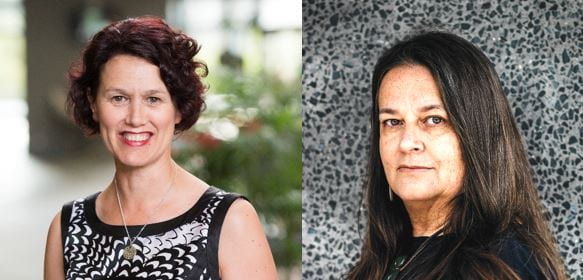Congratulations to A Better Start’s Deputy Director Gail Gillon and Māori Strategy theme leader Professor Helen Moewaka Barnes, who have both been elected Ngā Ahurei a Te Apārangi Fellows of the Academy of the Royal Society Te Apārangi.
Being made a Fellow is an honour that recognises distinction in research, scholarship or the advancement of knowledge at the highest international standards.
“On behalf of the Academy and Society, I heartily congratulate all the new Fellows,” says Chair of the Academy Executive Committee Professor Charlotte Macdonald. “The election process is rigorous and new Fellows can be rightfully proud that their outstanding achievements have been recognised by their peers in this way.”
Professors Gillon and Moewaka Barnes will be formally inducted at an event in Wellington on April 29.
ABOUT THE NEW FELLOWS
Professor Gail Gillon (Ngāi Tahu Iwi)
Professor Gail Gillon is a Deputy Director of A Better Start National Science Challenge, and Founding Director of the University of Canterbury’s Child Well-being Research Institute.
She is a world-leading expert in spoken and written language development. In particular, she studies the critical importance of phonological awareness (the ability to recognise and manipulate sounds within words) in facilitating reading and spelling success. She is an internationally recognised scholar in the area of early speech, language and reading development, and has made a substantial and lasting impact on the discipline of communication sciences and disorders. Her book Phonological Awareness from Research to Practice remains a leading text internationally in this area.
Professor Gillon’s research has resulted in transformation of both speech-language therapy and class teaching practices throughout the world. Her earlier successful intervention trials demonstrated how specific types of phonological processing instruction can rapidly accelerate the reading accuracy and reading comprehension abilities of children with dyslexia. She has also demonstrated through original research that it is possible to concurrently improve the speech intelligibility, reading and spelling of children who have speech sound disorders and who are at significant risk for persistent reading challenges. Her phonological awareness intervention materials that she developed for her research trials have been translated into a number of European languages.
Professor Gillon’s research, together with that of her colleagues, has culminated in the development of the Better Start Literacy Approach, Te Ara Reo Matatini. This is a systematic and culturally responsive approach to advancing oral language, and early reading and writing success in our 5- and 6-year-old tamariki. The approach is currently being rolled out in new entrant and year 1 classes across Aotearoa New Zealand as part of the Ministry of Education’s Early Literacy Initiative. This impact from Professor Gillon’s research is positively enhancing the well-being of thousands of children and their whānau in Aotearoa New Zealand.
Professor Helen Moewaka Barnes (Te Kapotai, Ngāpuhi-nui-tonu)
Professor Helen Moewaka Barnes is the Māori Strategy Theme Leader for A Better Start National Science Challenge, and Director of Whāriki and Co-director of the SHORE and Whariki Research Centre.
Professor Helen Moewaka Barnes (Te Kapotai, Ngāpuhi-nui-tonu) has had a significant international impact in the field of Indigenous peoples’ health and wellbeing. Her work is at the forefront of creating new knowledge in the determinants of health, wellbeing and mātauranga Māori, particularly in human and environmental relationships.
She co-founded the Whāriki Research Group and has worked tirelessly with allied researchers to shift the research surrounding Māori health to focus on rangatiratanga and hauora rather than what makes them sick. These ideas about Māori advancement rather than development are now widely taken up. She engages with community partners, colleagues and students to build research programmes that emphasise and work with community based mātauranga to determine local to global actions.
Throughout her research career, Professor Moewaka Barnes has made immense contributions to the development of mātauranga Māori, with innovations such as Te Huihuinga, a hui-based methodology, and A Wairua Approach, a methodology for explicitly including wairua as part of the research frame. She has tackled significant issues to Māori communities such as environmental degradation, the importance of spirituality, alcohol harm, and racism. Throughout her research career, Professor Moewaka Barnes has demonstrated strong leadership and sustained contribution to advancing mātauranga in social research.

